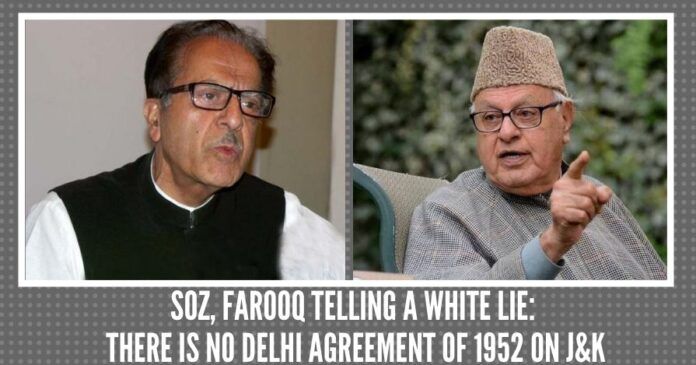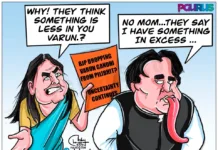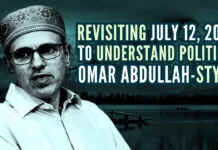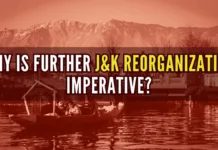
All this should call the bluff of Saif-ud-Din Soz and Farooq Abdullah and others of their ilk. The need of the time is the state’s full integration into India
On October 16, former Union Minister and senior Congress leader from Kashmir Saif-Ud-Din Soz took on J&K Governor Satya Malik and claimed that the latter was blissfully ignorant about the realities in the state. He, in fact, contested the statement of Malik that “Kashmiris (read Muslims) could not ask for anything more than the constituent assembly with a flag of their own” and said that “this is a clear misreading of the present situation in Kashmir”. Soz, in addition, pitched a “meaningful dialogue with separatists, in Syed Ali Shah Geelani, Mirwaiz Umar Farooq and Yasin Malik as they represented the anger in the mind of Kashmiris, particularly the youth”.
It would be only desirable to discuss very briefly the circumstances under which Nehru and the Sheikh met during June-July, 1952, and what transpired between the two.
Soz also took the opportunity to accuse New Delhi of subverting what he called “crucial decisions of the constituent assembly and wrecking the Delhi Agreement of 1952. Earlier, National Conference (NC) president Farooq Abdullah had also accused New Delhi of subverting the so-called Delhi Agreement of 1952. Farooq Abdullah had claimed that the Prime Minister, Jawaharlal Nehru, and the J&K Wazir-e-Aazam and his father, Sheikh Abdullah, and their aides had got involved in negotiations between June 14 and July 24, 1952, in order to work out an arrangement that shall regulate the Center-State relations and that the outcome of these lengthy and tortuous parleys was what he termed as the “Delhi Agreement”. He also claimed that the Delhi Agreement was signed on July 24 by Nehru and the Sheikh.
But this is just one side of the case. The other is far more interesting and startling. It, in the words of Farooq Abdullah, is that “it was the Parliament which (ratified the Delhi Agreement and) promised autonomy” and that “the bill (to this effect was) piloted (on July 24) by (the) then Prime Minister Jawaharlal Nehru”.
It may be recalled that it was in 1992 that Farooq Abdullah and his out-of-power Jammu and Delhi-based Kashmiri associates unleashed a no-holds-barred campaign to convince the Indian nation, the Parliament, the authorities in the South and North Blocks and the media that the root cause of the “Kashmiris’ alienation” was the conspiracy hatched by New Delhi and its power-hungry Kashmir agents to subvert the Delhi Agreement and bring J&K surreptitiously within the ambit of the Central laws and institutions. Even since then, they have been using all the available fora and saying that there is but one way in which the separatists can be deflated and the Kashmir problem solved and the estranged Kashmiris won over and that is by re-defining the Centre-J&K relations strictly in accordance with the lines indicated in the Delhi Agreement.
In effect, they (and their report on State autonomy and the June 26 Assembly – read NC – resolution on it) have been vouching for a dispensation that not only snaps all the State’s politico-constitutional ties with New Delhi and re-arms the Valley’s ruling class with extra-ordinary legislative, executive and judicial powers but also makes it mandatory for the Central Government to guard the State borders, protect J&K from foreign aggression and meet all the financial needs of the Kashmiris.
It would be only desirable to discuss very briefly the circumstances under which Nehru and the Sheikh met during June-July, 1952, and what transpired between the two. Such an exercise has become imperative in order to clear all the confusion, put things in a proper perspective and establish that there exists no such agreement as the Delhi Agreement.
It is very important to note that both Nehru and the Sheikh had arrived at an agreed solution only as regards the aims and ideals and bare outlines of the new constitution.
It needs to be noted that the whole exercise started on April 10, 1952, when the Sheikh made some highly inflammatory speeches at Ranbirsingh Pura in Jammu and repeatedly poured venom on the Indian State. Highly infuriated, Nehru asked the Sheikh to meet him and explain his position. The Sheikh and Nehru did meet. It was during this and the subsequent meetings that the Sheikh raised certain issues concerning the Center-State relations. In fact, the Sheikh told Nehru that he and his party were for an autonomous J&K. He also urged the Indian Prime Minister to allow the J&K Constituent Assembly, which was set up in 1951 after wholesale rigging, to frame a constitution that could empower the State to exercise absolute control over all matter minus those relating to three subjects – defence, foreign affairs and communications.
To be more precise, the Sheikh wanted Nehru to accept at least ten of his demands. These were :
- The “State Subjects”, or persons domiciled in J&K, will be the citizens both of the State and India.
- The “State Subjects” will have all the rights all over India but the “non-State Subjects” will have no right whatsoever in J&K.
- The fundamental rights as contained in the Indian Constitution will not be conferred on the “State Subjects in their entirety”.
- The State will have the power to “define and regulate the rights and privileges of the permanent residents of J&K”.
- The State will be allowed to have its own flag.
- The State will have the power to elect its own Head of the State or Sadar-e-Riyasat and the person so elected shall be answerable to it (read ruling party).
- Article 356 shall not be applicable to J&K. In other words, the Center will not intervene in the State in the case of international disturbance.
- Article 324 of the Indian Constitution will apply to the State only in the case of elections to Parliament as well as the offices of the President and the Vice-President.
- The Supreme Court of India will have limited jurisdiction over J&K. It will deal with only such disputes as are covered under Article 131 of the Union Commission
- All the residuary powers will be the sole preserve of the State.
It is very important to note that both Nehru and the Sheikh had arrived at an agreed solution only as regards the aims and ideals and bare outlines of the new constitution. Numerous matters, which will form the basis of Center-State relations, had been left undetermined as proper subjects for further discussion and explanation. Some of these issues such as the jurisdiction of the Supreme court, the jurisdiction of the Election Commission, emergency powers, fundamental rights and questions of finance were yet to be clinched.
It was on July 24, 1952, that Nehru informed the Lok Sabha as to what transpired between him and the Sheikh. And, what he told has been taken by the NC as a solemn agreement between New Delhi and Srinagar. This, despite the fact that there is no Constitution (Application to J&K) Order to this effect. The Lok Sabha statement of the Indian Prime Minister, which was rather ambiguous on several issues, has no moral, legal or constitutional significance.
However, to write all this is not to suggest that there exists no written agreement between the Center and the Sheikh. There exists one and that is the 1975 Indira-Sheikh Abdullah accord. And, this has been implemented in its entirety. The Sheikh became the State Chief Minister in 1975 itself under this accord despite the fact that his party did not have even a single legislator either in the Assembly or in the Council. Not only this, the Sheikh gave up his 25-year-old demand in favor of greater autonomy in 1981, when the Chairman of the Central Laws Review Committee and the then J&K Deputy Chief Minister, D D Thakur, submitted his report and told the Chief Minister that the “needles of the clock cannot be turned back” and that the application of the provisions of the Indian Constitution to J&K had not only benefited the State but also the “State Subjects”.
All this should call the bluff of Saif-ud-Din Soz and Farooq Abdullah and others of their ilk. The need of the time is the state’s full integration into India and removal of all such provisions from the Indian Constitution which have driven the state out of the political and constitutional organization of India.
Note:
1. The views expressed here are those of the author and do not necessarily represent or reflect the views of PGurus.
- ‘Kashmir My core constituency’: Revisiting July 12, 2003 to understand politics, Omar Abdullah-style - March 15, 2024
- Total deviation from traditional approach: Seven takeaways from PM Modi’s March 7 Srinagar visit - March 9, 2024
- Status of political parties: Why is further J&K reorganization imperative? - March 1, 2024











Can we blame them for being dictated by religious (and Islamic) fatwa? After all, they are Muslims first and last–and, hence owe allegiance to the Islamic state of Pakistan.
Nothing strange, other than to our nincompoop leaders. Congress included.